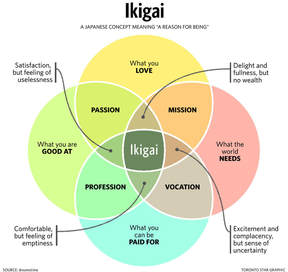What is the role of work in our life? Is leisure really the opposite of work, or more correctly, is work merely the means to finance a life of leisure, if not right away, then in the future? The parable of the small fisherman and the big businessman captures some of these questions. We have versions of the story as one between a Mexican fisherman and an American investment banker, or an African fisherman and a British banker (as in the video linked here), or a Mumbai stock broker and a Goan fisherman - multiple versions of the same really. We could have a conversation on the class/ colonial/ race subtexts of these stories another day perhaps, but for now, taking the parable as is, does one look at it and say if work and ambition is about attaining a certain kind of leisure, then why not seek a measured leisure right away?  Then, on the other hand, is the idea of Ikigai - of what work can really be. Work as a life's journey, a way of being where what one loves to do, what is needed, what pays the bills and what one has the capabilities for meet in this wonderfully utopian space of Ikigai, where work is no longer a trial or a sufferance, but a joy that is worth the effort and the pain, and brings rewards and impact as well. Ah! What a space to live in where work is beautifully satisfying. Like the perfect curd rice, or that right on the dot tenderloin steak - or whatever rocks your boat, that keeps you going for more and more and you can stay engaged in it forever. Then again, is it worth it if this search for Ikigai overshadows everything else? Should work be a priority over home, family, health etc? One would hope that one can have Ikigai but still be alive and happy in other ways as well. Within this conceptual diagram of what Ikigai is, the idea of a 'Professional World' is where many of u find ourselves: Professional workplaces with people working to get better and better at what they are doing and getting better and better compensation for it. This is also where much of the discussion on Mental Health in the Workplace happens. For a large number of us, the things we love and things we know the world needs become hobbies or social projects/ weekend volunteering, and the professional workplace is the mainstay that provides security and safety, and satisfaction to the extent it does. Who we are at the workplace, and how the workplace is to us both are key for mental health. If we are but shadows of ourselves in the workplace and/or if the workplace is a tyrannical grindstone, work soon ceases to be even a profession and descends into drudgery, or worse. The tango between the worker and the workplace needs only either of them to mis-step for it to quickly cease to be the dignified profession it seeks to be and become a mockery of it at extremes being a slave-house or a den of ineptitude dragging a once-great idea into bankruptcy, in the tug between the 'Professional Life' and the 'Personal Life.'
Listening to her and thinking further about it, there are a few things that seem really key to good mental health in the workplace for the individual:
1. A keen respect for one's work, including an ongoing spirit to learn and improve 2. A balance between work with other passions, including love and joy, and letting one defer to the other when needed. 3. A willingness to fight against injustices, and win allies in the process that can help change unjust systems rather than stay under its tyranny 4. An ability to take help when needed, and to hold the longer-term view on life and living. Mental health in the workplace is more personal than about personnel. When we know what place work has in our lives, and can expect and influence our workplaces to care about what's personal to each of us and help as they can, we will see greater mental health in the workplace. |
InnerSight BloggersAjanta, Mahesh and other InnerSight counsellors and guest contributors are happy to share their thoughts here. Categories
All
Archives
September 2020
|

 RSS Feed
RSS Feed